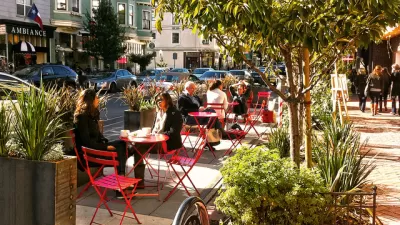Paul Barter answers with an unequivocal no. He outlines the reasons why debates over the elimination of parking minimums should be decoupled from transit, and identifies other reforms that can make parking changes palatable.
"There is a widespread belief that reform of minimum parking requirements requires excellent public transport," says Barter. "We see this in recent parking reform debates in US cities, such as Portland, Seattle and Washington, DC for example."
"But surely this is mistaken."
"If eliminating parking minimums actually FORCED parking closures and low-parking development, then maybe this link with public transport would make sense," he adds. "But reform of parking requirements is NOT about preventing developers from providing parking! It merely ALLOWS them to choose how much parking they supply. In locations where they see the need, they will keep supplying plentiful parking."
Barter goes on to identify other reforms, including reducing nuisance parking, improving management of on-street and public parking, and dynamic pricing, that will help overcome political obstacles and local resident concern over adjusting parking minimums.
FULL STORY: Parking reform does NOT need excellent transit

Planetizen Federal Action Tracker
A weekly monitor of how Trump’s orders and actions are impacting planners and planning in America.

Maui's Vacation Rental Debate Turns Ugly
Verbal attacks, misinformation campaigns and fistfights plague a high-stakes debate to convert thousands of vacation rentals into long-term housing.

Restaurant Patios Were a Pandemic Win — Why Were They so Hard to Keep?
Social distancing requirements and changes in travel patterns prompted cities to pilot new uses for street and sidewalk space. Then it got complicated.

In California Battle of Housing vs. Environment, Housing Just Won
A new state law significantly limits the power of CEQA, an environmental review law that served as a powerful tool for blocking new development.

Boulder Eliminates Parking Minimums Citywide
Officials estimate the cost of building a single underground parking space at up to $100,000.

Orange County, Florida Adopts Largest US “Sprawl Repair” Code
The ‘Orange Code’ seeks to rectify decades of sprawl-inducing, car-oriented development.
Urban Design for Planners 1: Software Tools
This six-course series explores essential urban design concepts using open source software and equips planners with the tools they need to participate fully in the urban design process.
Planning for Universal Design
Learn the tools for implementing Universal Design in planning regulations.
Heyer Gruel & Associates PA
JM Goldson LLC
Custer County Colorado
City of Camden Redevelopment Agency
City of Astoria
Transportation Research & Education Center (TREC) at Portland State University
Jefferson Parish Government
Camden Redevelopment Agency
City of Claremont





























